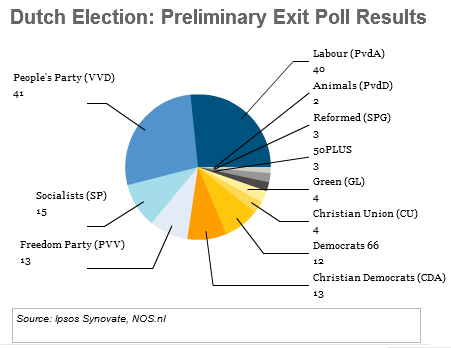UPDATE (6 pm ET): Results are coming in slowly (see here for real-time results). Some exit polls are now showing the VVD could win 44 seats. If so, I think it’s possible for the VVD to form a majority government without Labour — they’d need the CDA, Democrats 66 and several of the smaller parties, including the Greens. But it’s *just* barely doable. If Rutte could pull it off, it would be quite an accomplishment, and it would give the Netherlands a much more stable government than it’s had since 2010, although maybe not an ironclad government through 2016. Samsom would remain in the opposition, and could build on his very strong performance in advance of the next election.
* * * *
UPDATE (3:30 pm ET): The first exit poll is out, showing the free-market liberal Volkspartij voor Vrijheid en Democratie (VVD, the People’s Party for Freedom and Democracy) and the social democratic Partij van de Arbeid (PvdA, Labour Party) essentially tied for first place. The Ipsos projection has the VVD of prime minister Mark Rutte with 41 seats and the Labour Party of Diederik Samsom with 40 seats.
The Soalistische Partij (SP, the Socialist Party) wins 15 (as many as they won in 2010), but a sharp fall from polls that showed the Socialists leading the election less than a month ago. Geert Wilders’s anti-immigration, anti-Europe party, the Partij voor de Vrijheid (PVV, the Party for Freedom), will fall from 24 seats to just 13, and the Christen-Democratisch Appèl (CDA, Christian Democratic Appeal), fall from 21 to 13 seats.
If the projection holds, I think Labour is likely headed into government, one way or another. With the collapse in support for the Socialists, it seems more likely than not that Samsom and Rutte will be forced to negotiate a so-called ‘purple’ coalition together, although an anti-austerity coalition could not be ruled out — the result now is too close, however, to know if Labour will win more seats, thereby making Samsom the likelier candidate to become the next Dutch prime minister.
It will have been an incredibly disappointing night for Wilders — who many consider a bit of a demagogue. His problems are three-fold: (i) voters blame the PVV for early elections (with a campaign that interrupted holiday season!), (ii) Wilders’s attempt to turn his populist formula from anti-Islam to anti-Europe was clunky and obvious and insincere, and (iii) Dutch voters just aren’t anti-Europe to the degree Wilders was arguing — Netherlands was a founding member of the European Coal and Steel Commission, after all!
It’s nearly as bad a night for Emile Roemer, who dropped like a stone after Samsom impressed voters in the debates and Roemer seemed to flail. Voters realized that Samsom, a relatively leftist leader of the Labour Party, was close enough on the substance of budget austerity to Roemer, but with the poise of a potential prime minister and sufficiently pro-Europe not to scare Berlin and Brussels. Samsom seemed to offer the same message but in a package that wouldn’t embarrass the Netherlands on the international stage.
It’s also a good night for stability — it’s the first time in nearly a decade that two parties would hold over 40 seats each in the Tweede Kamer. It looks like, even in the closing days of the campaign, voters moved tactically to the VVD and to Labour, and away from the smaller parties — that bodes well for stability over the next four years, if Rutte and Samsom or Samsom and others can agree a credible coalition program.
* * * *
Dutch voters are at the polls today to select the 150 members (by proportional representation) to the Tweede Kamer, the lower house of the Dutch parliament. ![]()
Follow all of Suffragio‘s coverage leading up to the election here.

One thought on “Dutch election today; UPDATE: VVD, Labour tied for first place”